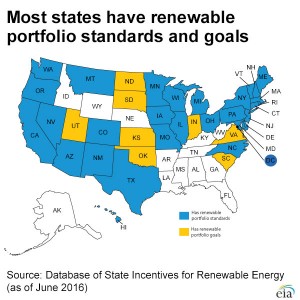Letter by Joey James and Evan Hansen, Charleston Gazette, March 18, 2018
For many years, private and government forecasts have predicted sharp declines in Central Appalachian coal production in southern West Virginia, eastern Kentucky, southwestern Virginia and northeastern Tennessee. These declines have occurred, largely as predicted, and our region has suffered.
Even after Donald Trump’s election, headlines tell stories of miners losing their jobs, mines closing, companies filing for bankruptcy and decreases in severance tax revenues — which have significant impacts on local economies and the wellbeing of Central Appalachia’s people.
Meanwhile, in what seems like an entirely different world, investment across the country in renewable energy is at an all-time high. While our coal-fired power plants are closing, new plants fueled by natural gas, wind farms and solar arrays are being built in large numbers. In recent years, global investments in renewables were more than double those for new coal and natural gas generation.
There is no silver bullet to solve Central Appalachia’s economic woes, and modernizing our region’s generation portfolio is only part of the solution. However, when taken together, three state-sponsored incentives have been proven to attract significant investments, and at this point, that is what we need — significant investments.
If Central Appalachia wishes to promote growth in the renewable energy industry, the following policies should receive support:
• Renewable portfolio standards.
• Renewable portfolio standards require
• electricity producers to integrate a certain amount of renewable energy. Most states have an RPS, and in 2016, the 29 states with an RPS and Washington, D.C., accounted for nearly 75 percent of our nation’s GDP. States without an RPS contributed just over 16 percent. The rest have enacted voluntary goals rather than standards. No Central Appalachian states have enacted mandatory standards, and only Virginia has enacted a goal.
• Net metering.
• For electric customers that generate their own electricity, net metering allows for the flow of electricity both to and from the customer — typically through a bi-directional meter. When generation exceeds use, electricity from the customer flows back to the grid, offsetting electricity consumed at other times. All Central Appalachian states, with the exception of Tennessee, have enacted legislation that enables net metering.
• Property-assessed clean energy financing.
• Property-assessed clean energy financing allows commercial property owners to borrow money for energy efficiency and renewable energy projects and repay the amount borrowed through an assessment added to their tax bill. Kentucky and Virginia have passed PACE-enabling legislation. West Virginia and Tennessee should follow suit.
Worldwide, private sector champions of the 21st century economy are making vigorous commitments to sustainability and renewable energy. Google, for example, powers 100 percent of its operations, including many data centers, with renewable energy through power-purchase agreements.
Amazon, another quintessential 21st century business, is committed to achieving 100 percent renewable energy across its global infrastructure and is currently constructing wind and solar farms in Ohio, Virginia, Indiana and North Carolina. When completed, these installations will deliver more than 1.6 million megawatt-hours of renewable energy into the electric grids that power Amazon Web Services’ cloud data centers.
Attracting investments, jobs and tax revenues from these types of companies will require new policies like the three presented above, and legislatures, state agencies and local governments should act now. New energy jobs are being created across the country — why not here?
NOTE — Joey James and Evan Hansen assist communities across Appalachia on issues related to sustainable economic development. They work for Downstream Strategies and are based out of Morgantown.
>>>>>>>>>>>>>>>>>>>>>>>>>>>>>>>>
Sustainable Development Goals (SDGs) are a collection of 17 global goals set by the United Nations for achievement by 2030 (next 12 years). … The SDGs cover a broad range of social and economic development issues. These include poverty, hunger, health, education, climate change, gender equality, water, sanitation, energy, environment and social justice.

